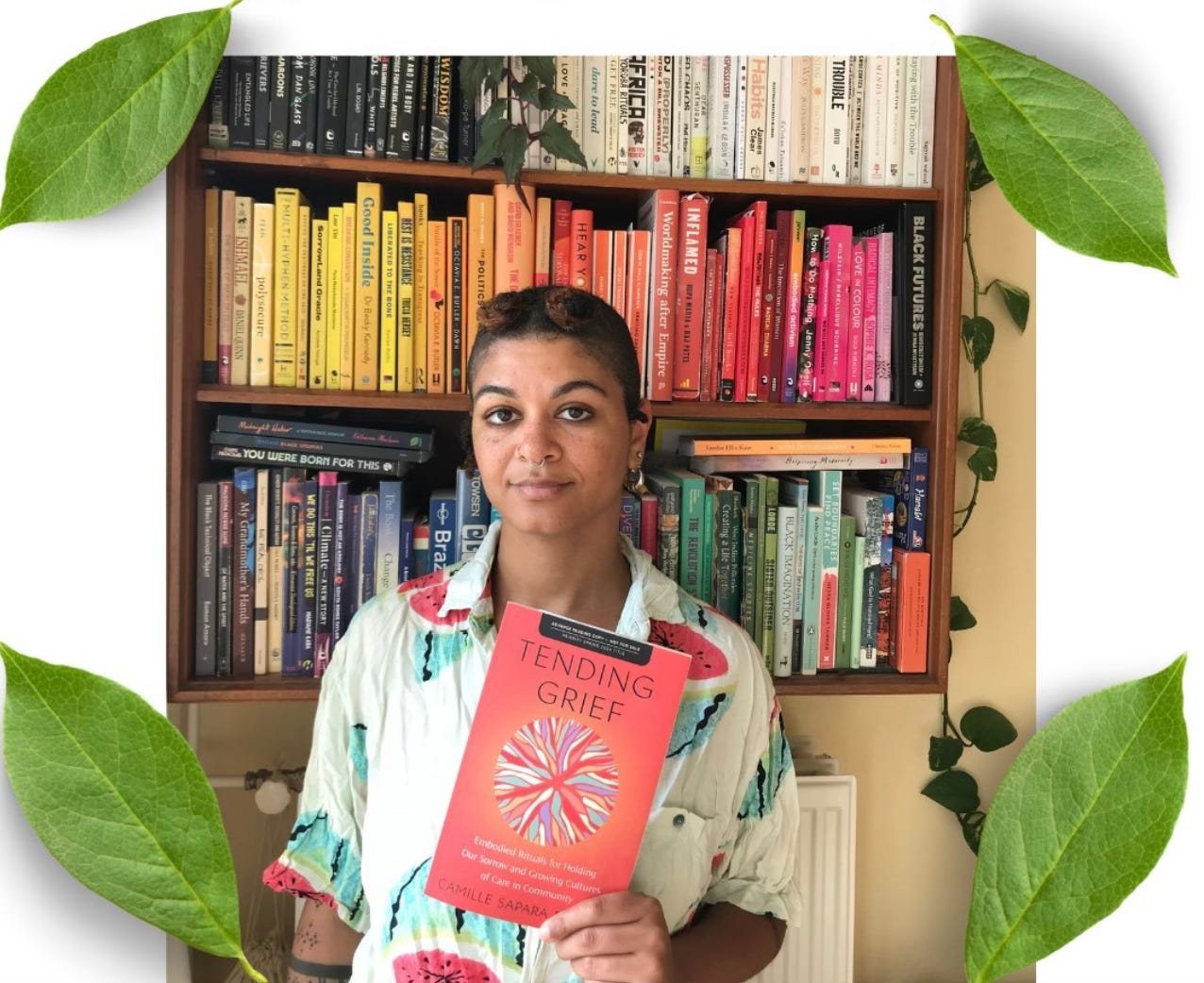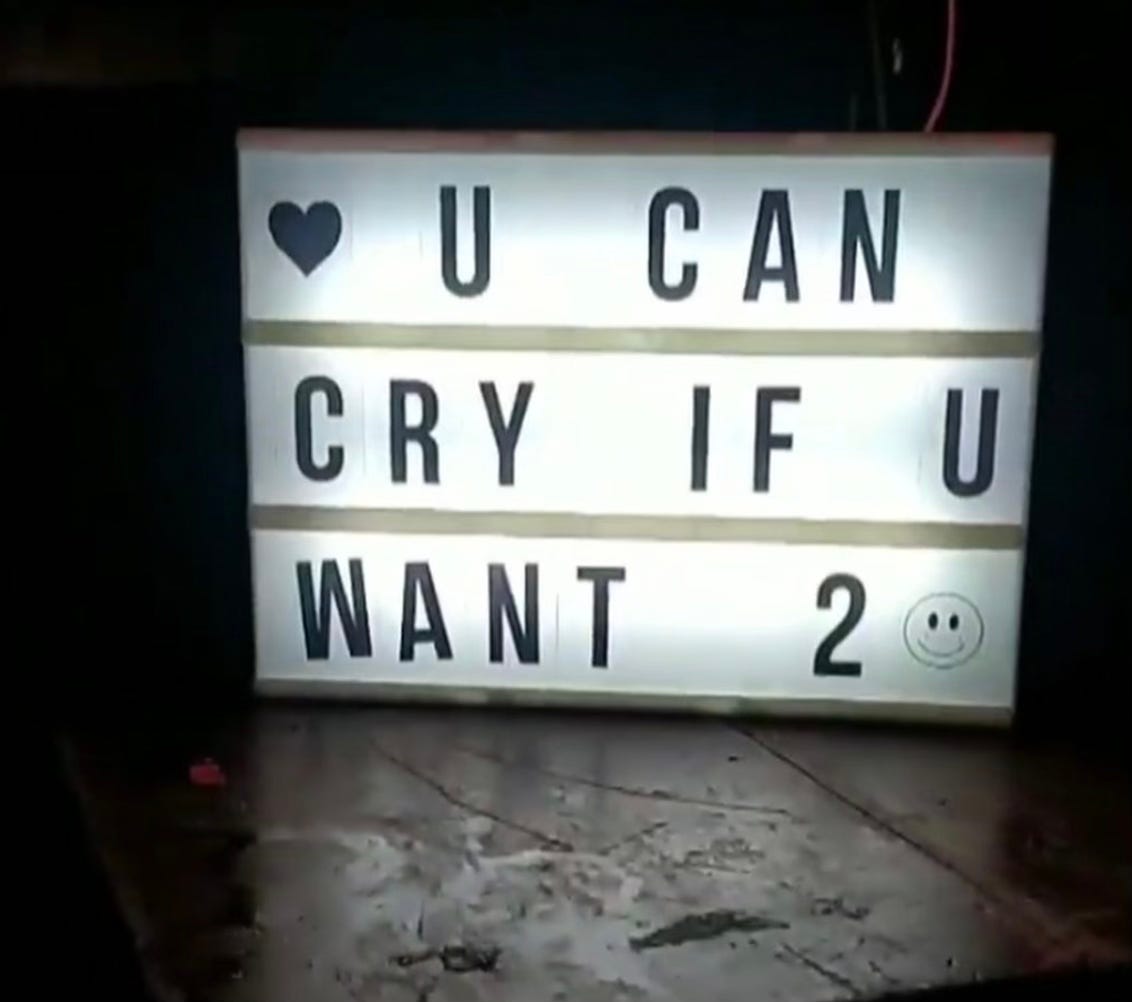Hii! This newsletter is in celebration of a new book by
called Tending Grief: Embodied Rituals for Holding Our Sorrow and Growing Cultures of Care in Community. A beautiful friend and feeler, I’ve spoken about Camille’s work before, in this piece about grief as revolutionary resistance. I’m a little nostalgic thinking about the ways we have grown alongside each other over the years, as broken butterflies emerging from within the imperial core of whiteness we were born into, as ravers on Europa’s best and worst dance floors, and as grief workers trying stuff out.Camille has been a tremendous support and guide to me in the development of misery, the mental health collective i’m part of. They ran the first ever workshop at the first ever misery event in 2019, performed at our party in berlin, have held space through listening and signposting at our other parties and currently facilitate our bi-monthly online grief space, open to all QTIBPOC.
I am chuffed to have been interviewed for this book about the work and origins of misery, grief under capitalism and the relief of ancestral mystery, and to have some thoughts nestled within the crucial wisdoms Camille has collated and excavated and created for us here. We badly need this stuff. Bestie adrienne maree brown agrees, saying:
“Camille Sapara Barton is a gift to all of us, because they understand that every single one of us will grieve, and they have given us a way to understand how we can grieve in community and center care in the inevitable transitions of our lives. This is what emergent strategy looks like at the precipice.”
You can pre-order Tending Grief in the USA / Canada | In the UK / EU and subscribe to their substack at
. Read on for an excerpt of my chapter with some special photos from the archive :)A CONVERSATION WITH AISHA FROM MISERY ABOUT GRIEF WORK WITHIN THE CLUB CONTEXT
Camille:
How did the idea for misery emerge?
Aisha:
misery started in 2018 as an idea and it eventually formed into our first event in 2019. It started for several different reasons. I have always worked in mental health in some capacity, but I was slightly tired of working in trauma response, which is where I had been for the years prior. I was a bit burned out from that, but I still knew that I wanted to work on some kind of mental health project because that’s where my heart is.
I was trying to think about how I could start something that would feel nourishing for me as well. As someone who loves nightlife, music, and the club, the idea of blending nightlife and mental health intervention felt aligned. Another part of it was having lots of friends and knowing people in the wider community with substance-use issues. I was starting to feel quite saturated, as a friend, in terms of how much I could personally hold.
Many of the queer parties were the same sort of space, centering a specific kind of hedonism related to fashion or being an extrovert. I got a little bit wary of the scene and the cycle of getting really fucked up in those spaces and then feeling suicidal on the Monday afterward. This was the cycle that I was seeing among a lot of peers and some close friends as well. Through conversations, we started thinking about what it would be like to create an alternative nightlife space. Clearly, queer people need and love the club, but we wanted to provide an option that centered care and supportive mental health practices.
I had an online friend that I would chat to around that time, as we were both suffering with our mental health. We were trying to plan a meetup and they were saying, “I wish there was somewhere I could go and be with other people, but I don’t feel like I can because I’m just so depressed. I wish there was somewhere I could go as I am,” and I was like, “Oh my god, we should start something, like a depression club, a place where you can go and just be depressed together.” This sort of became one of our original tag lines which is: “You can cry if you want to.”
Keep reading with a 7-day free trial
Subscribe to off-grid baby to keep reading this post and get 7 days of free access to the full post archives.








